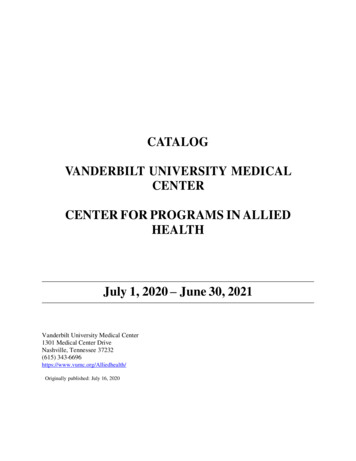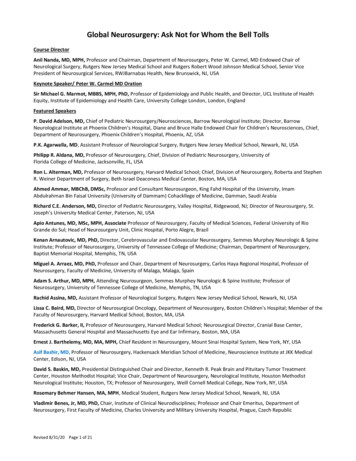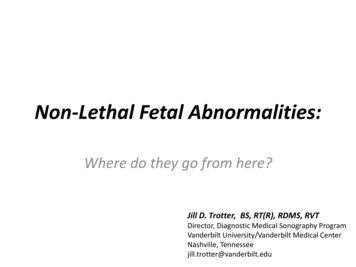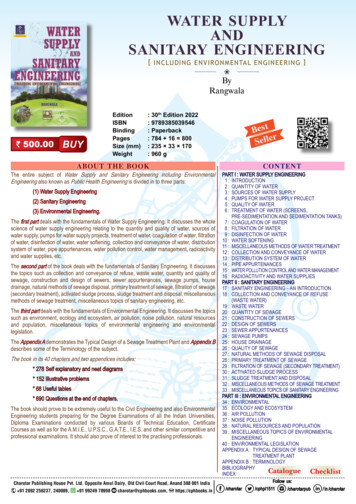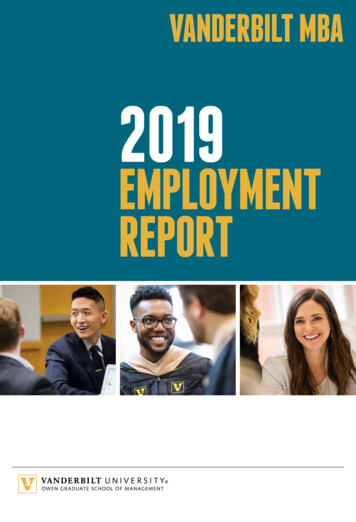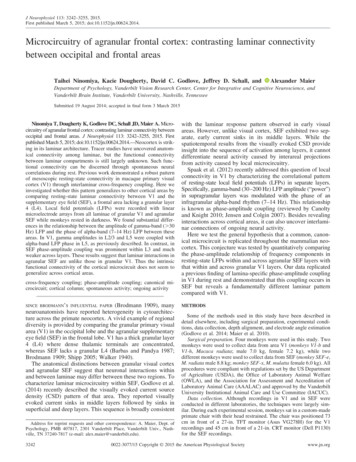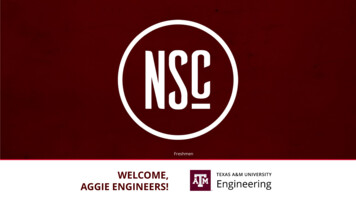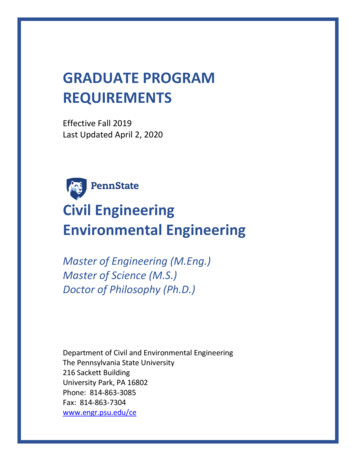
Transcription
School ofEngineeringEEngineering Educationin a University Setting288Degree Programs in Engineering290Special Programs292Honors294Academic Regulations296Courses of Study301Engineering Courses325Administration and Faculty350
288VANDERBILT UNIVERSITYEngineering Education in a University SettingVANDERBILT University School of Engineering is thelargest and oldest private engineering school in theSouth. Classes offering engineering instruction beganin 1879, and seven years later Engineering was made a separatedepartment with its own dean. The school’s program emphasizes the relationship of the engineering profession to societyand prepares engineers to be socially aware as well as technically competent.The mission of the School of Engineering is threefold: toprepare undergraduate and graduate students for roles thatcontribute to society; to conduct research to advance thestate of knowledge and technology and to disseminate theseadvances through archival publications, conference publications, and technology transfer; and to provide professionalservices to the community.The school strives to meet the undergraduate educationportion of its mission by offering degree programs in fields ofengineering relevant to the needs of society. An objective ofthese programs is to provide a technical education integratedwith strong humanities, fine arts, and social sciences subjectmatter to provide the requisite foundation for life-long learning. The availability of second majors and minors in subjectareas in other schools and colleges of the university increasesopportunities for engineering students to enhance theireducation by pursuing studies in the non-technical disciplines.Engineering students take close to 50 percent of their coursesoutside of the School of Engineering and associate daily withpeers from other schools and colleges within the university.Another objective is to accommodate students who willcontinue their studies at the graduate level in engineeringor in other professional fields, as well as those who intend toenter engineering practice upon graduation. To this end, ourprograms emphasize mathematics and engineering sciences,yet provide significant exposure to engineering design andhands-on laboratory experiences.A large fraction of the student body is destined for management positions early in their working careers. To meet thesestudents’ needs, the Engineering Management program offersa well-integrated curriculum, including a minor.The bachelor of engineering serves those programs inengineering where professional registration through stateboards is desirable or necessary. Typically, about 90 percentof the students are enrolled in programs that are accredited bythe Engineering Accreditation Commission or the ComputingAccreditation Commission of ABET (abet.org).The bachelor of science addresses the needs of those students seeking specialized programs not served by conventionalengineering degree programs. The degree provides studentswith a general scientific and engineering background whileallowing individual curricular desires to be addressed. Forexample, students who want to use a degree from the School ofEngineering to enter the primary or secondary education fieldsmay include the necessary courses in education from PeabodyCollege in their engineering degree program.Students at all levels have the opportunity to work withfaculty in the generation of new knowledge. Those planningfor graduate studies and research may participate in individualtopics and research courses to fulfill that desire. Engineeringstudents also participate in the university’s Summer ResearchProgram for Undergraduates.FacilitiesThe School of Engineering is housed in 5 main buildings withseveral satellite facilities. William W. Featheringill Hall whichhouses a three-story atrium designed for student interaction and social events, more than fifty teaching and researchlaboratories with the latest equipment and computer resources,and project rooms. The new Engineering and Science building is an eight-story state of the art building that houses theWond'ry at the Innovation Pavilion, numerous research labs,interactive class rooms, clean rooms and space for studentsto work, study and socialize. School administrative officesand several classrooms are located on the ground floor of theScience and Engineering building in Stevenson Center, whichalso houses the Biomedical Engineering Department on the8th and 9th floors. Jacobs Hall, which flanks FeatheringillHall, contains laboratories, office and classrooms serving boththe Civil and Environmental Engineering Department andthe Electrical Engineering and Computer Science Department. The Olin Hall of Engineering houses Chemical andBiomolecular Engineering, Mechanical Engineering andMaterials Science. Several other satellite facilities that arepart of the Engineering School include: the W. M. Keck FreeElectron Laser Center building, housing the labs and offices ofthe Biomedical Photonics Center; the LASIR (laboratory forsystems integrity and reliability), a hangar-style facility locatedoff-campus dedicated to scaling up experiments to realisticand full size, including a wind tunnel and military aircraft;the MuMS facility (multiscale modeling and simulation); theVanderbilt Institute of Software Integrated Systems; and theInstitute for Space and Defense Electronics, providing officespace, dry laboratories and conference space.In all its engineering programs, Vanderbilt recognizesthe valid place of experimental and research laboratories inthe learning experience. Laboratories are planned to providethe strongest personal contact between students and facultymembers consistent with enrollment.Well-equipped undergraduate laboratories are maintainedby the Departments of Chemistry and Physics in the Collegeof Arts and Science, which offers mathematics and basicscience courses required of all engineering students. Graduateand undergraduate divisions of these departments maintainteaching and research facilities in the Stevenson Center for theNatural Sciences, as does the Department of Earth and Environmental Sciences. Another supporting department, Biological Sciences, is housed in Medical Research Building III. Mostclasses in humanities and the social sciences are conducted inButtrick, Calhoun, Furman, Garland, and Wilson halls.AccreditationAll programs leading to the B.E. degree are accredited by theEngineering Accreditation Commission of ABET (abet.org).The bachelor of science program in computer science is accredited by the Computing Accreditation Commission of ABET(abet.org).
School of Engineering / Engineering Education in a University Setting289Employment of GraduatesOf the recent Vanderbilt graduates with baccalaureate degreesin engineering, about 70 percent entered directly into professional practice. Thirty percent continued with graduate or professional education. Others pursued diverse careers or otherinterests. Additional information regarding the employmentof engineering graduates is available in the Career Center.Supporting OrganizationsVanderbilt Engineering CouncilThe Engineering Council is a student organization whosemain goal is facilitating communication between administration, faculty, and students in the School of Engineering. Officers of the Engineering Council are elected by the engineeringstudent body, and representatives from the professionalsocieties complete the organization’s membership. While thecouncil has no administrative power, it provides studentswith a voice in the decision-making process in the School ofEngineering.Professional SocietiesThe leading national engineering societies have charteredbranches or student sections at Vanderbilt. These organizations are run locally by students with the help of a facultyadviser. Meetings are devoted to matters of a technical nature,including films, outside speakers, plant trips, and other subjects of interest to the membership.Student speakers from the Vanderbilt groups competeannually with speakers from other groups in their region intechnical paper competitions.Freshmen and sophomores are cordially invited to attendmeetings—and juniors and seniors are urged to join—as theywill find the work of the professional societies beneficial inorienting them in their careers.The student professional societies are:American Institute of Aeronautics and Astronautics(A.I.A.A.)American Institute of Chemical Engineers (A.I.Ch.E)American Society of Civil Engineers (A.S.C.E.)American Society of Mechanical Engineers (A.S.M.E.)American Society for Metals (A.S.M.)Association for Computing Machinery (A.C.M.)Institute of Electrical and Electronics Engineers (I.E.E.E.)International Society for Hybrid Microelectronics(I.S.H.M.)International Society for Optics and Photonics (SPIE)National Society of Black Engineers (N.S.B.E.)Society of Automotive Engineers (S.A.E.)Society of Hispanic Professional Engineers (S.H.P.E.)Society of Engineering Science (S.E.S.)Society of Women Engineers (S.W.E.)Vanderbilt Biomedical Engineering SocietyGraduating seniors may join the Order of the Engineer, asociety that recognizes the commitment of its members to theprofession of engineering.E
290VANDERBILT UNIVERSITYDegree Programs in EngineeringBACHELOR of engineering degree programs are offeredin the areas of biomedical, chemical, civil, computer,electrical, and mechanical engineering. Many of theseprograms allow considerable flexibility—but students arerequired to include in their courses of study those bodies ofknowledge fundamental to each discipline.Bachelor of science degree programs offered in the interdisciplinary engineering disciplines often allow strong concentration in other areas of engineering or in the College ofArts and Science. The B.S. is awarded in the areas of computerscience and engineering science.The school offers the master of engineering (M.Eng.), withemphasis on engineering design and practice, in most areasof study. The Graduate School, through departments of theSchool of Engineering, offers the research-oriented Ph.D. andM.S. degrees in eight major fields. Degree programs offered bythe School of Engineering are shown below.Degree ProgramsB.E.B.S.M.Eng.M.S.Ph.D.Biomedical Engineering Chemical Engineering Civil Engineering Computer Engineering Computer ScienceCyber-Physical Systems Electrical Engineering Engineering ScienceEnvironmental Engineering Materials Science and EngineeringMechanical Engineering Undergraduate DegreesBachelor of EngineeringThe bachelor of engineering is offered in biomedical, chemical,civil, computer, electrical, and mechanical engineering. TheB.E. degree requirements vary from 125 to 128 semester hours.Students seeking double majors will require somewhat morecredit hours.Bachelor of ScienceThe bachelor of science is offered in computer science andengineering science, requiring 120 and 121 semester hours,respectively. These programs have more flexibility in electivechoice than the B.E. degree programs.The First YearMany courses normally scheduled for the freshman year arecommon to both the B.E. and B.S. degree programs. While thecurriculum for the freshman year is generally the same for all students, there are important variations. For example, somemajor programs require a full year of introductory chemistry;others do not. Students should become familiar with requirements of those programs in which they have an interestand confer with their adviser at the time of enrollment andthroughout the freshman year to work out a program of studythat will keep options open as long as possible.Specimen curricula for the engineering programs are givenin the Courses of Study chapter. Requirements for the B.E. andB.S. degrees for the various programs vary in the minimumamount of work and specific course requirements in the basicsciences and in specific subject requirements in mathematics.Included in the freshman year is the course Engineering Science 1401–1403 (Introduction to Engineering), which introducesthe student to design tools used in all areas of engineering.Some students may qualify for advanced placement oradvanced credit in mathematics, science, the humanities andsocial sciences, or computer science. If advanced credit isawarded, it will not affect the student’s Vanderbilt grade pointaverage.
School of Engineering / Degree Programs in EngineeringMathematics and PhysicsEntering engineering students will be placed in the appropriate level mathematics course. Students offering one full year ormore of high school credit in analytic geometry and calculusmay qualify for advanced placement in a regular sequence byscoring well on the Advanced Placement Examination.Students with high mathematical ability and achievementmay apply for enrollment in the Math 2500-2501 sequenceas a substitute for Math 2300. For more information, see thecourse descriptions under Mathematics in the Arts and Science section of this catalog. For majors requiring Math 2420(Methods of Ordinary Differential Equations), students mayselect Math 2400 (Differential Equations with Linear Algebra)as a substitute.Students with inadequate backgrounds in mathematicsmay be required to take Math 1005 (Pre-calculus Mathematics). Taking this course constitutes an additional requirementfor graduation.Math 1010-1011 (Probability and Statistical Inference) andMath 1100 (Survey of Calculus) cannot be credited toward adegree in the School of Engineering.Students with greater interest in physics may enroll inPhys 1911, 1912, 1912L, and 2255L (Principles of Physics I and IIand labs) as substitutes for Phys 1601, 1602, 1601L, and 1602L(General Physics I and II and labs), respectively.Pre-calculus courses Phys 1010 and 1010L cannot be credited toward a degree in the School of Engineering.Liberal Arts CoreIn order to provide the elements of a general educationconsidered necessary for responsible practice as an educatedengineer, the School of Engineering requires each student tocomplete at least 18 hours in the Liberal Arts Core comprising:1. At least 3 hours selected from courses classified in theAXLE Curriculum Course Distribution of the College of Artsand Science as Humanities and Creative Arts (HCA), with theexception of CMST 1500, 2100, 2110, and 2120, and2. At least 3 hours selected from courses classified in theAXLE Curriculum Course Distribution of the College of Artsand Science as Social and Behavioral Sciences (SBS).The remaining hours are to be selected from:1. Courses classified in the AXLE Curriculum Course Distribution of the College of Arts and Science as Humanities andCreative Arts (HCA), International Cultures (INT), Historyand Culture of the United States (US), Social and BehavioralSciences (SBS), and Perspectives (P)2. CS 1151 and ENGM 24403. Arabic 1101, Chinese 1011, 1012, 1101, English 1100, French1101, German 1101, Greek 1101, Hebrew 1101, Italian 1101, Japanese 1011, 1012, 1101, Latin 1101, Portuguese 1101, Russian 1101,and Spanish 1100, 11014. Peabody College courses in Psychology and Human Development numbered 1205, 1207, 1250, 2200, 2250, 2300, 2400,2500, 2550, 2600, and 3150, and in Human and OrganizationalDevelopment numbered 1250, 1300, 2100, 2260, 2400, 2500,2700, and 32325. All MUSC, MUSE, MUSO, COMP, MREP, MUTH, andperformance courses in the Blair School of Music, exceptMUSO 1001291Open ElectivesCourses excluded from the listings in the Liberal Arts Coremay be taken as open electives.Officer EducationCourse offerings in military science and naval science aredescribed in the chapter on Special Programs for Undergraduates near the front of the catalog. All officer education coursesdesignated as eligible for credit may be taken as open electives.In addition, officer education courses in history and politicalscience carry AXLE designations and may be taken as part ofthe Liberal Arts Core. AFROTC students may count 6 hoursof the military courses as open electives.Master of EngineeringThe master of engineering (M.Eng.) is an advanced professional degree awarded by the School of Engineering and especially designed for engineering practitioners who may preferto work while doing professional study. It is also suitable forindividuals who apply directly from undergraduate school—but the thrust of the program is toward professional practicein engineering rather than research or teaching. The degreeis currently offered in biomedical engineering, chemicalengineering, civil engineering, cyber-physical systems, electrical engineering, environmental engineering, and mechanicalengineering.Students must complete 30 hours of approved course work.For information on the Accelerated Graduate Program inEngineering degrees, see the chapter on Special Programs. Amaximum of 6 hours of graduate-level course work may betransferred from another institution. Residency requirementsare flexible, and a maximum period of seven years is allowedto complete the degree. An extensive, written design reportshall be submitted on a project approved by the student’sproject adviser.Admission to the Master of Engineering program normallyrequires graduation from an approved undergraduate program in engineering or a related scientific discipline, attainment of a B average in undergraduate courses applicable tothe student’s career goals, and recommendations containingfavorable appraisals of professional promise and attitude. Aperiod of successful work experience prior to application tothe program will also be given consideration. Application foradmission should be sent to the associate dean of the School ofEngineering. Further information about the program may beobtained by writing to the same office.For international students who did not graduate from aninstitution in a country where English is the official language,proficiency in English must be shown by a minimum score of89 on the TOEFL or 7 on the IELTS test.For information on integrated bachelor and master ofengineering degrees, see the chapter on Special Programs.E
292vanderbilt universitySpecial ProgramsHonors ProgramsHonors programs allow selected undergraduate students todevelop individually through independent study and research.Individual honors programs are described in the Courses ofStudy chapter.Requirements vary somewhat but, in general, to qualify forconsideration a student should have (a) completed the technical course requirements of the first two years, (b) attaineda minimum grade average of 3.5 in all work taken for credit,and (c) shown evidence indicating a capacity for independentstudy and/or research. Formal admission is by election of thedepartment concerned. Once admitted, candidates remainin the program only if they maintain a 3.5 or higher gradeaverage.Accepted candidates normally begin honors study in thejunior year, but exceptions may be made for outstandingseniors.Successful candidates are awarded Honors in their area ofinterest. This designation appears on their diplomas.Study AbroadVanderbilt's Global Education Office offers approximatelythirty programs that allow students to take engineering orcomputer science courses in English abroad, in locationsranging from Dublin to Sydney, Cape Town to Hong Kong.There are no language prerequisites for these programs. Theseprograms also allow students to take a range of liberal artscore and elective courses abroad. A student may not apply toparticipate in a Vanderbilt approved direct-credit programfor transfer credit through a different university or throughan external agency and then seek to transfer that credit intoVanderbilt. Financial aid can be used for study abroad duringthe academic year, and scholarships are available to supportsummer study abroad. Students are encouraged to discusswith their academic advisers how best to incorporate studyabroad into their four-year plans of study. All students intending to receive credit from studying abroad must register theirtravels in advance with International SOS. Further informationcan be obtained from the Vanderbilt Global Education Office.Teacher EducationStudents who are interested in preparing for licensure as secondary school teachers should plan their programs in consultation with the associate dean in the School of Engineering. TheSchool of Engineering and Peabody College offer a teachereducation program leading to secondary school licensure inphysics (grades 9 through 12) and computer technology. Students major in engineering science in the School of Engineeringand complete a second major in education at Peabody College.More specific information on professional education courserequirements can be found under the Licensure for Teachingchapter in the Peabody College section of this catalog. Inquiriescan also be made to the Office of Teacher Licensure at Peabody.Double MajorIt is possible for a student to combine an engineering fieldwith a second area outside the School of Engineering. Thestudent must obtain prior approval of each department andsatisfy the requirements of each major, including the requirement regarding minimum grade point average.Certain double majors involving two programs withinthe School of Engineering have been approved by the faculty.The approved double majors are biomedical engineering/electrical engineering, and biomedical engineering/chemicalengineering.The double major is indicated on the student’s transcript.Only one degree is awarded, from the school in which thestudent is enrolled.MinorsA minor consists of at least five courses of at least 3 credithours each within a recognized area of knowledge. A minoroffers students more than a casual introduction to an area, butless than a major. A minor is not a degree requirement, butstudents may elect to complete one or more. Courses may notbe taken on a Pass/Fail basis. A minor for which all designatedcourses are completed with a grade point average of at least 2.0will be entered on the transcript at the time of graduation.When a minor is offered in a discipline that offers amajor, only those courses that count toward the major maybe counted toward the minor. Students should refer to theappropriate sections of this catalog for specific requirements.Currently, minors are offered in engineering management,materials science and engineering, computer science, environmental engi neering, energy and environmental systems, nanoscience and nanotechnology, scientific computing, and mostdisciplines of the College of Arts and Science, Blair School ofMusic, and Peabody College.Students should declare their intention to pursue minorsby completing forms available in the Student Services Office ofthe School of Engineering. Departments and programs assignadvisers to students who declare minors in their areas. Students are responsible for knowing and satisfying all requirements for the minors they intend to complete.Three-Two ProgramThe School of Engineering recognizes a Three-Two programwith certain liberal arts colleges. This plan allows students toattend a liberal arts college for three years of undergraduatestudy, usually majoring in mathematics or science, wherethey meet the residence requirements for a degree from thatinstitution. They then transfer to the Vanderbilt UniversitySchool of Engineering for two years of technical work in anengineering curriculum. Upon completion of the five years,students receive two bachelor’s degrees, one from the liberalarts college and one from the School of Engineering. Studentswho lack the preparation to begin the junior curriculum intheir major will need three years at Vanderbilt to complete thebachelor of engineering.To complete all required technical courses at Vanderbilt intwo years, students enrolled in the Three-Two program shouldcomplete, before coming to Vanderbilt, as many as possibleof the mathematics and science courses listed in the specimencurriculum—in general, mathematics through differentialequations, a year of physics, a year of another laboratoryscience (usually chemistry), and a semester of computer
School of Engineering / Special Programsprogramming. Students should plan their three years of liberalarts study so as to satisfy as nearly as possible the freshmanand sophomore requirements of the particular engineeringcurriculum in which they will major at Vanderbilt.Admission to the Three-Two program must be certified bythe liberal arts college and is recognized by Vanderbilt University School of Engineering through special agreement betweenVanderbilt and each of the liberal arts colleges participating inthe Three-Two program.Dual Degree Program with Fisk UniversityA coordinated dual degree program between the VanderbiltUniversity School of Engineering and Fisk University is especially designed to permit students to obtain an A.B. degree inbiology, chemistry, computer science, physics, or mathematics from Fisk and a B.E. or B.S. degree in engineering fromVanderbilt, generally within five years.For the first three years, the student is enrolled at Fisk ina science curriculum and, by cross-registration in the secondand third years, takes introductory engineering courses atVanderbilt. During the fourth and fifth years, the student isenrolled at Vanderbilt, following principally an engineeringcurriculum at Vanderbilt and completing science courses atFisk. At the end of five years, the student should be able tosatisfy the requirements for both bachelor’s degrees.Financial aid is available for qualified, deserving students.Additional information is available from the director of transfer admissions in the Office of Undergraduate Admissions.Bachelor of Science in Computer Science/Master ofScience in FinanceA program of study is available in which students can obtaina B.S. in computer science from the School of Engineering infour years and be well prepared for admission to the Masterof Science in Finance program in the Owen Graduate Schoolof Management. Students spend their fifth year of study at theOwen School. Admission to the Master of Science in Financeprogram is contingent upon performance. Students receive astrong background in computer programming and economics; minors in engineering management and mathematicsare facilitated, providing further depth in preparation for theM.S.F. The recommended curriculum is maintained on thecomputer science portion of the webpages of the Departmentof Electrical Engineering and Computer Science.Integrated Bachelor and Master of EngineeringOn the basis of recommendations containing favorableappraisals of professional promise, undergraduate studentsin the School of Engineering who have completed at least 75hours with at least a 3.0 grade point average may be acceptedinto an integrated Bachelor of Engineering–Master of Engineering program. The last two years of a student’s program isplanned as a unit.With the approval of the student’s adviser, the director ofgraduate studies in the student’s major department, and thesenior associate dean, students apply through the associatedean for graduate studies for admission to this integrateddual degree program. Upon admission to this program, asecond “career” will be set up for the student which will allowthe student to start taking graduate courses (course numbers 5000) during the junior and senior years. These courses willbe credited toward the master of engineering. Note that nodouble counting of courses is allowed (i.e., the student must293meet the degree requirements for each degree independent ofthe other degree). The student typically receives the bachelor’sdegree at the end of the fourth year and completes the masterof engineering during the fifth year. Further informationcan be obtained from the director of graduate studies of thestudent’s major department.Accelerated Graduate Program in EngineeringStudents who enter Vanderbilt with a significant number ofcredits (20 to 30 hours), earned either through AdvancedPlacement tests or in college courses taken during high school,may be eligible for the Accelerated Graduate Program inEngineering. Through this program, a student is able to earnboth a bachelor’s degree and a master of science in about thesame time required for the bachelor’s degree. To be eligible forthe program a student must complete 86 hours (senior standing) by the end of the sophomore year with at least a 3.5 gradepoint average. With the approval of the student’s adviser, thedirector of graduate studies in the student’s major department,and the senior associate dean, students apply through the associate dean for graduate studies for admission to this accelerated dual degree program. Upon admission to this program, asecond “career” will be set up for the student which will allowthe student to start taking graduate courses (course numbers 5000) during the junior and senior years. These courses willbe credited toward the master of science. Note that no doublecounting of courses is allowed (i.e., the student must meet thedegree requirements for each degree independent of the otherdegree). The student receives the bachelor’s degree at the endof the fourth year and typically spends the summer finishinga master’s thesis to complete the master of science. Furtherinformation can be obtained from the director of graduatestudies of the student’s major department.E
294vanderbilt universityHonorsFounder’s MedalThe Founder’s Medal, signifying first honors, was endowedby Commodore Cornelius Vanderbilt as one of his giftsto the university. The recipient is named by the dean afterconsideration of faculty recommendations and the grade pointaverages of the year’s summa cum laude graduates.Latin Honors DesignationHonors noted on diplomas and published in the CommencementProgram are earned as follows:Summa Cum Laude. Students whose grade point averageequals or exceeds that of the top 5 percent of the previousyear’s Vanderbilt graduating seniors.Magna Cum Laude. Students whose grade point averageequals or exceeds that of the next 8 percent of the previousyear’s Vanderbilt graduating seniors.Cum Laude. Students whose grad
the Civil and Environmental Engineering Department and the Electrical Engineering and Computer Science Depart-ment. The Olin Hall of Engineering houses Chemical and Biomolecular Engineering, Mechanical Engineering and Materials Science. Several other satellite facilities that are part of the Engineering School include: the W. M. Keck Free
